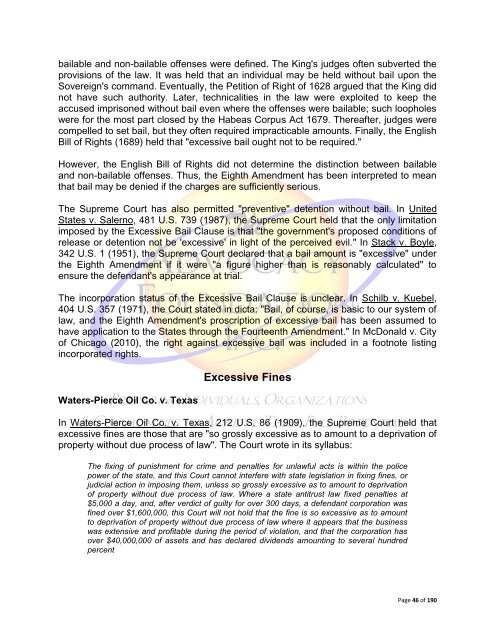The Violent Crime and Law Enforcement Act of 1994
The Violent Crime and Law Enforcement Act of 1994
The Violent Crime and Law Enforcement Act of 1994
You also want an ePaper? Increase the reach of your titles
YUMPU automatically turns print PDFs into web optimized ePapers that Google loves.
ailable <strong>and</strong> non-bailable <strong>of</strong>fenses were defined. <strong>The</strong> King's judges <strong>of</strong>ten subverted the<br />
provisions <strong>of</strong> the law. It was held that an individual may be held without bail upon the<br />
Sovereign's comm<strong>and</strong>. Eventually, the Petition <strong>of</strong> Right <strong>of</strong> 1628 argued that the King did<br />
not have such authority. Later, technicalities in the law were exploited to keep the<br />
accused imprisoned without bail even where the <strong>of</strong>fenses were bailable; such loopholes<br />
were for the most part closed by the Habeas Corpus <strong>Act</strong> 1679. <strong>The</strong>reafter, judges were<br />
compelled to set bail, but they <strong>of</strong>ten required impracticable amounts. Finally, the English<br />
Bill <strong>of</strong> Rights (1689) held that "excessive bail ought not to be required."<br />
However, the English Bill <strong>of</strong> Rights did not determine the distinction between bailable<br />
<strong>and</strong> non-bailable <strong>of</strong>fenses. Thus, the Eighth Amendment has been interpreted to mean<br />
that bail may be denied if the charges are sufficiently serious.<br />
<strong>The</strong> Supreme Court has also permitted "preventive" detention without bail. In United<br />
States v. Salerno, 481 U.S. 739 (1987), the Supreme Court held that the only limitation<br />
imposed by the Excessive Bail Clause is that "the government's proposed conditions <strong>of</strong><br />
release or detention not be 'excessive' in light <strong>of</strong> the perceived evil." In Stack v. Boyle,<br />
342 U.S. 1 (1951), the Supreme Court declared that a bail amount is "excessive" under<br />
the Eighth Amendment if it were "a figure higher than is reasonably calculated" to<br />
ensure the defendant's appearance at trial.<br />
<strong>The</strong> incorporation status <strong>of</strong> the Excessive Bail Clause is unclear. In Schilb v. Kuebel,<br />
404 U.S. 357 (1971), the Court stated in dicta: "Bail, <strong>of</strong> course, is basic to our system <strong>of</strong><br />
law, <strong>and</strong> the Eighth Amendment's proscription <strong>of</strong> excessive bail has been assumed to<br />
have application to the States through the Fourteenth Amendment." In McDonald v. City<br />
<strong>of</strong> Chicago (2010), the right against excessive bail was included in a footnote listing<br />
incorporated rights.<br />
Waters-Pierce Oil Co. v. Texas<br />
Excessive Fines<br />
In Waters-Pierce Oil Co. v. Texas, 212 U.S. 86 (1909), the Supreme Court held that<br />
excessive fines are those that are "so grossly excessive as to amount to a deprivation <strong>of</strong><br />
property without due process <strong>of</strong> law". <strong>The</strong> Court wrote in its syllabus:<br />
<strong>The</strong> fixing <strong>of</strong> punishment for crime <strong>and</strong> penalties for unlawful acts is within the police<br />
power <strong>of</strong> the state, <strong>and</strong> this Court cannot interfere with state legislation in fixing fines, or<br />
judicial action in imposing them, unless so grossly excessive as to amount to deprivation<br />
<strong>of</strong> property without due process <strong>of</strong> law. Where a state antitrust law fixed penalties at<br />
$5,000 a day, <strong>and</strong>, after verdict <strong>of</strong> guilty for over 300 days, a defendant corporation was<br />
fined over $1,600,000, this Court will not hold that the fine is so excessive as to amount<br />
to deprivation <strong>of</strong> property without due process <strong>of</strong> law where it appears that the business<br />
was extensive <strong>and</strong> pr<strong>of</strong>itable during the period <strong>of</strong> violation, <strong>and</strong> that the corporation has<br />
over $40,000,000 <strong>of</strong> assets <strong>and</strong> has declared dividends amounting to several hundred<br />
percent<br />
Page 46 <strong>of</strong> 190
















